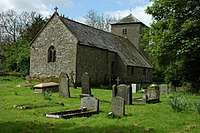St Michael's Church, Llanvihangel Gobion
The Church of St Michael, Llanvihangel Gobion, Monmouthshire is a parish church with datable origins to the 15th century. There is no record of a Victorian restoration, although one must have occurred (the weathervane bears the date 1846), but there is documented evidence of a "light" reconstruction in 1925. Since the date, the church has barely been altered. It remains an active parish church and a Grade II* listed building.
| St Michael's Church, Llanvihangel Gobion, Monmouthshire | |
|---|---|
| Church of St Michael and All Angels | |
 "a medieval church, largely unrestored" | |
 St Michael's Church, Llanvihangel Gobion, Monmouthshire Location in Monmouthshire | |
| Location | Llanvihangel Gobion, Monmouthshire |
| Country | Wales |
| Denomination | Church in Wales |
| History | |
| Status | Parish church |
| Founded | C15th century |
| Architecture | |
| Functional status | Active |
| Heritage designation | Grade II* |
| Designated | 9 January 1956 |
| Architectural type | Church |
| Style | Perpendicular |
| Administration | |
| Parish | Llanvihangel Gobion |
| Deanery | Raglan/Usk |
| Archdeaconry | Monmouth |
| Diocese | Monmouth |
| Clergy | |
| Vicar(s) | The Reverend Canon Tim Clement |
History
The datable elements of the church are from the 15th century, although its origins may be earlier, it sits in a circular churchyard and an earlier sculpture has been incorporated into its South wall near the tower.[1] The similarities of the roof-line and tower with those at St Cadoc's Church, Llangattock-juxta-Usk may suggest the involvement of the Gloucestershire engineer John Upton in a Victorian rebuilding, although there is no documented evidence of this.[1] Upton also undertook work at the nearby Pant-y-Goitre Bridge.[2] The architectural historian John Newman writes that the church was "lightly restored in 1925".[3] It remains an active parish church[4] and a Grade II* listed building.[1]
Architecture and description
The church is constructed of Old Red Sandstone rubble.[5] The most notable interior features are the "timber aisle-posts, polyganol and moulded"[3], Cadw recording the "good internal carpentry including unusual timber arcade".[1] Of particular interest is a crudely carved stone depicting two angels holding what appears to be a shroud possibly below that of another figure (sadly headless)which could represent a figure of the resurrected Christ. This is possibly from a chapel or other religious establishment which originally stood here. Also of note is the impressively large base of a 14th century preaching cross opposite the South porch.
Notes
- "Listed Buildings - Full Report - HeritageBill Cadw Assets - Reports". cadwpublic-api.azurewebsites.net.
- Stuff, Good. "Pant-y-Goitre Bridge, with approach embankments and flood arches, Llanover, Monmouthshire". www.britishlistedbuildings.co.uk.
- Newman 2000, p. 293.
- Morgan, Cheryl. "The Raglan Group of Parishes". www.raglan-parishes.org.uk.
- "St Michael, Llanfihangel Gobion".
References
- Newman, John (2000). Gwent/Monmouthshire. The Buildings of Wales. London: Penguin. ISBN 0-14-071053-1.